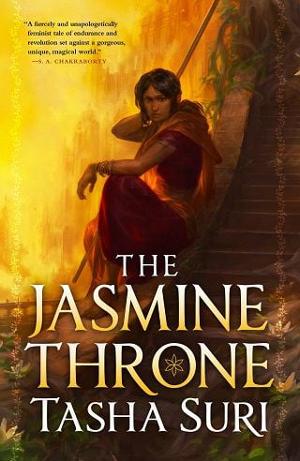Chapter 66: Priya
PRIYA
It was no burden to carry Ashok’s weight, even though he seemed convinced that it was. She could feel the fragility of his body: the in and out of his breath rattling his ribs, the wetness in his lungs.
“You’ll fall under my weight,” Ashok said to Priya, his voice uneven. There was blood on his lips, falling like tears from his eyes.
“Don’t lean on me entirely, and we’ll be fine, then,” she said.
They walked forward in silence for a moment. Then he said, “Kritika carries a crown mask with her. When we’re thrice-born—one of us should wear it.”
“We don’t need crowns or masks,” said Bhumika tiredly.
“But we do need power,” Ashok responded. Doubled over with coughing. Bhumika looked away from them, her face a mask of its own kind, and kept on walking. But Priya stopped, allowing him to breathe, still holding him up.
He was going to be fine, she reminded herself. Once they had passed through the deathless waters, his strength would return to him.
“Priya,” he said, after a moment. “Priya. You—you need to know.”
“What?”
“I killed Chandni. Or as good as killed her. I left her tied to the rot-riven tree. And Sendhil.” A heaved breath. “The elders are all gone. We’re all that remains.”
Dead. Chandni dead.
The words rung in Priya’s head like a bell. I killed her. I left her tied to the rot-riven tree. I killed her.
She couldn’t speak for a long moment. Then she forced her tongue, her lips to move, even though they felt leaden.
“Why are you telling me this? Do you want me to be happy about it?”
“I just wanted you to know,” Ashok murmured.
“By soil and sky, why?”
“It’s your right to know,” he said. “Consider it my deathbed confession.”
He did not sound guilty. She wasn’t sure if she wanted him to. She only knew that the knowledge felt like a blow to the skull; it rang in her ears still. She couldn’t think around it, and yet she tried. What was the last thing she had said to Chandni? How had Chandni looked at Priya when Priya had left her? She couldn’t recall it. She hadn’t thought she would want to.
“She was an old woman who was dying anyway. And you’re not afraid of killing. I should have expected it. And I shouldn’t care.” Priya’s throat felt thick. It was hard to force the words out. “And I wish I could say that I don’t know why you’re like this—why you always gut the heart out of me, over and over—but I know why. I lived through our childhood too.” She looked away from him. “We’re here.”
They stood at the base of the Hirana.
Bhumika gave Priya a level look, and Priya shook her head. “We don’t need to climb,” Priya said swiftly. “The Hirana knows me. And I know it. It will let us in.”
Bhumika didn’t argue when Priya passed the weight of Ashok over. He rested on Bhumika’s shoulder as Priya pressed a hand to the Hirana’s deep gray stone, awash with mosaics of moss. The Hirana felt her. Welcomed her.
The way opened.
It was a tunnel. Lightless, dark, but a way through all the same.
“All of you,” said Priya. “Follow me.”
They walked together into the darkness. Priya could smell the deathless waters growing closer, fresh and sharp as a cold night. The liquid cosmos of them, almost within their reach.
And then, quite suddenly, there they were.
The deathless waters lay before them, incandescent blue in the darkness of the hollow temple. Priya took Ashok from Bhumika’s grip; guided Ashok to the edge and released him. He kneeled down by the water, palms flat to the ground. He breathed, long ragged breaths, heavy with blood, and touched his forehead to the soil.
Next to Priya, Bhumika was staring at the pool, her hands in fists at her sides. The rebels milled behind them, terror and wonder on their faces.
“Should we be saying some special words?” Priya muttered to Bhumika. “To make them feel better?”
Bhumika sighed, tipping her head back as if to say, Spirits save me, then said, “Or we can enter the water and be done with this.”
But some of the tension had unfurled from her hands. When Priya reached for her, Bhumika laced their fingers together. Squeezed, once.
“Come forward,” gasped Ashok, and the other vial-poisoned rebels stepped forward, standing at the edge of the water. “We enter the water,” he said. “If we’re lucky, we emerge. And then we protect Ahiranya. We do our duty.”
There was a murmur of agreement. Ashok looked up at Priya. His eyes were wet.
Priya looked at him in return and chose not to think of all he had done. She thought instead of the fact that she and Ashok and Bhumika were the last survivors of their family, a family not of blood but of history and suffering, love and the kind of hurt that only love can breed.
She held her hand out to him. He took it and stood with care.
She looked at the water ahead of her. Forced herself not to think of anything, not to hope for anything, as she clutched her siblings’ hands tightly, and entered.
And sank.
Falling and rising are alike, in water, when you’re deep enough, and the deathless waters were a thing without ending. They were a cold, brilliant blue—the blue of the universe. The blue of stars enfolded in skeins of sky that contained all things. Priya was deep within them, eyes open, lungs burning. She wondered if she would drown.
She could not remember this. Had this happened the last time she entered? Had it happened the first? She kicked her feet and did not know if she was rising to the surface or dragging herself deeper.
She raised her arms in front of her. In the wavering water, to her panicked eyes, her skin was like shadow—the shade thrown between great trees, deep darkness blurred to the charcoal of light beneath dappled leaves.
She couldn’t breathe. She kept kicking, kept struggling to rise when she didn’t know what rising was. But eventually she could hold out no longer. She opened her mouth, and sucked in a burning breath, and drank in the waters. Drank, and was consumed.
She lifted her head, gasping for air. It took her a moment to realize her lungs were not burning. The water around her was dark, but within it floated the roots of lotus flowers, swirling and twining. Within them were bodies.
And there, before her once more, was the yaksa.
It did not wear her face this time.
“Ah, sapling.” It sounded fond. “You like this face better. I knew you would.”
“You’re not her,” whispered Priya. “Please. Don’t be her. That isn’t what I want.”
The yaksa shook its head. Malini’s dark curls floated loose around its face, with its elegant bones and fathomless eyes.
“But you do,” the yaksa said. It touched her cheek once more. Drew its fingers back, and wound about the tip Priya saw a thread or a root—a thing of blood and green twined. “I know you. We’re bound, you and I. So I know.”
“Please,” Priya said again.
The yaksa shook its head once more, and Malini’s curls blurred into a halo, and the yaksa… changed.
Deep marigold eyes. Hair of coiling vines. Rose-red mouth.
A smile that was all thorns, sharp as points of light.
It was both beautiful and like a woman deep in the throes of rot. Its head was tilted, gold-petaled eyes fixed upon her chest.
“What is worship?” the yaksa asked.
She knew this.
“Hollowing,” she said. “It is…” And she trailed off, looking down at where the yaksa gazed. Her shadowy chest was a cavity, a blown-open wound. The wound was covered in a profusion of petals; the bones were angular striations of wood, the blood a clean and sweet sap of leaf. Within it lay a pulsing heart of… flowers.
She looked at what had been her heart. Thought of Ashok’s words, when he had called the yaksa a cuckoo in the body. She remembered the tree behind Chandni’s hermitage.
The yaksa raised a hand. Neatly, it snapped a finger free and breathed upon it. The finger was wood, and it curved and sharpened, neatly carved by the yaksa’s breath. Even before the yaksa held the knife out to her, Priya knew it was sacred wood, a thing born from the sacrifice of a yaksa’s flesh and blood. And she knew—with a horror and hunger that shook her—what she was expected to do.
“Hollow yourself,” the yaksa said.
“I can’t,” she said. “How can I?”
“Every time you come here, you do this,” it said, in a voice both gentle and unutterably cruel. “Every time, the water fills you from head to toe, and you ask yourself the question: Shall I allow the water to obliterate and remake me, or shall I hold all my mortal flesh tight? Shall I keep this soul contained, in the vial of my flesh, this poisonous body bound to death, or become one with the waters of the universe?”
Was this why the others had died? Because they’d been unwilling to make the sacrifice—to be less or more than human?
She’d fought to be here, over and over, and now she was. And yet her shadow of a hand trembled, as she reached for the knife. As she placed her fingertips upon it, they burned.
“This is the only way I can be strong enough to save Ahiranya,” she whispered. “This is the only way I can save my family.”
The yaksa said nothing.
Priya took the blade. Held it against her own skin of shadow, her skin of soul. And cut a place for the magic.
There was no pain. Only a feeling like air leaving her lungs, like water rushing in, and then fire, and then a clear light, green and pure.
In her throat, something caught. Something of the mortal soul. Something of lifeblood.
The flower she’d given Malini. A needle-flower.
She’d placed a bit of her heart inside that.
“I can’t give you everything,” she gasped out around the drawing wound of it. “I don’t have it any longer.”
“No matter,” the yaksa said gently. “No matter, sapling. We have enough.”
She thought of heart’s blood, of love and fury and the sweet place in between, where thoughts of Malini dwelled. And the bloom—the sapling—that was her own magic grew and grew, until she knew she was not exactly Priya anymore. Perhaps she never had been. Perhaps from the moment she’d arrived on the Hirana as an infant, the deathless waters had been remolding her from within, making her a vessel for their magic and their voices, discarding all the parts of her that made her a mortal woman with a simple mortal heart.
“This too,” she heard the yaksa say, “can be hollowed away in time.”
And then Priya was in the water once more, cold and brilliant and blue, and she was kicking her feet. She knew the way now. She was remade and whole, and she knew how to rise.
She rose, heaving for breath, coughing water from her lungs even as she struggled to stay on the surface, legs kicking through heavy nothing. She swam to the shore and dragged herself up, up.
Bhumika was already there, her hair sodden, her face mottled with cold and relief.
“Yaksa,” Priya gasped out, and Bhumika turned her head with firm hands. Another rebel—a fellow temple child, now—thumped her back hard once, twice, and then Priya was vomiting water on the stone, no more words spoken.
She couldn’t remember what she intended to say. But her cheek burned with a cool fire and she could not forget the feeling of roots and flowers rising up where her heart should have been, unfurling their way to her soul. A hollowing.
But it had felt right. It had felt glorious. And she had learned something, in that moment of change; something about what it meant to be a temple elder. Something about what it meant to serve the yaksa.
Something that was already fading.
She clung to it tight, and felt a pain, sharp, in her cheek where the yaksa had drawn its nail across her flesh. The pain held fragments of the memory down, like a stitch through cloth.
“I thought you wouldn’t rise,” Bhumika said through chattering teeth. “Priya, you took so long. So…” And then to Priya’s shock, Bhumika was embracing her, breathing hard, unsteady breaths against Priya’s wet hair. Priya clung back reflexively.
“Ashok,” she whispered. “Where is Ashok?”
Bhumika said nothing. One of the rebels was wailing, a low keening cry.
“You can’t go back in, Priya,” Bhumika said finally. “You can’t.”
Priya shook her off. Turned, back toward the water, still on her knees. And Bhumika was tackling her to the ground, but Priya was stronger, she could throw Bhumika off without even trying—
“Stop,” said Bhumika. “Stop, stop, please stop. Pri. Priya.” She pressed her cheek to Priya’s own. Her skin was wet, with water and tears. “He’s gone, Priya.”
“No. No, he’s not.”
“He’s gone,” Bhumika said again, and Priya knew she was right. She could feel the absence of him. The silence in the sangam. “He’s gone.”
 Fullepub
Fullepub 



